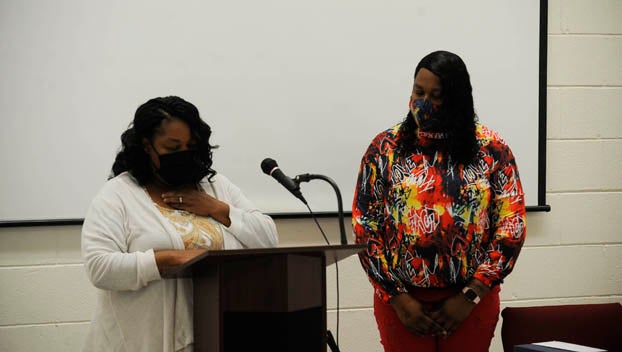Program helps WHA tenants build toward homeownership
Published 9:02 pm Wednesday, March 31, 2021

- WHA Family Self-Sufficiency Program Director Edith Cobb, left, delivers a speech during the program graduation ceremony for Regina McNeill right. (Brandon Tester / Washington Daily News)
|
Getting your Trinity Audio player ready...
|
Washington Housing Authority’s Family Self-Sufficiency Program gives public housing residents and Section 8 program participants resources they can use to improve their quality of life.
The program offers families and individuals counseling, coaching and referral services that can help them improve their economic standing. Topics addressed through those services include job training, education, budgeting, credit, child care, career advancement and others.
“It helps them better position themselves to become a homeowner,” said Edith Cobb, WHA’s Family Self-Sufficiency Program coordinator.
The housing authority opens an escrow account for each participant in the program. Because families in WHA programs pay rent based on a percentage of their income, their rent bill rises whenever their income grows. When a Family Self-Sufficiency participant’s income rises, WHA deposits money accordingly into their account, which helps the family build its savings while also recuperating some of the additional rent costs. Cobb said some participants have reached up to $11,000 in their escrow account.
Each family is given access to its escrow account upon graduating from the program, and they can also use some of the funds to achieve their goals while in the program.
As its name indicates, self-sufficiency is one of the main goals for the program’s participants. There are several smaller milestones leading up to that; what they entail is up to each family. Regina McNeill, the program’s most recent graduate as a head-of-household, worked on improving her credit score, paying off debt and finding full-time employment.
“She is my first graduate who is actually going to be a homeowner,” Cobb said. “So she is going to be moving out of the Housing Authority and will become self-sufficient. And that is the goal of the program.”
In the fiscal year 2019-20, six participants graduated from the Self-Sufficiency Program, with their escrow checks averaging $4,389.56. The program had 47 participants at the time WHA filed its 2020 annual report.





